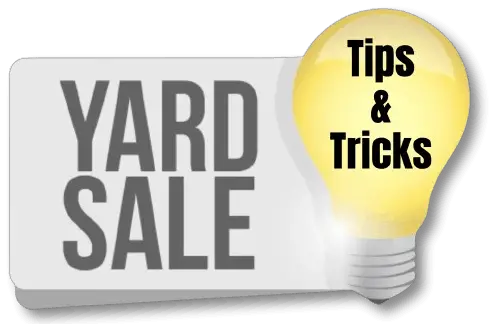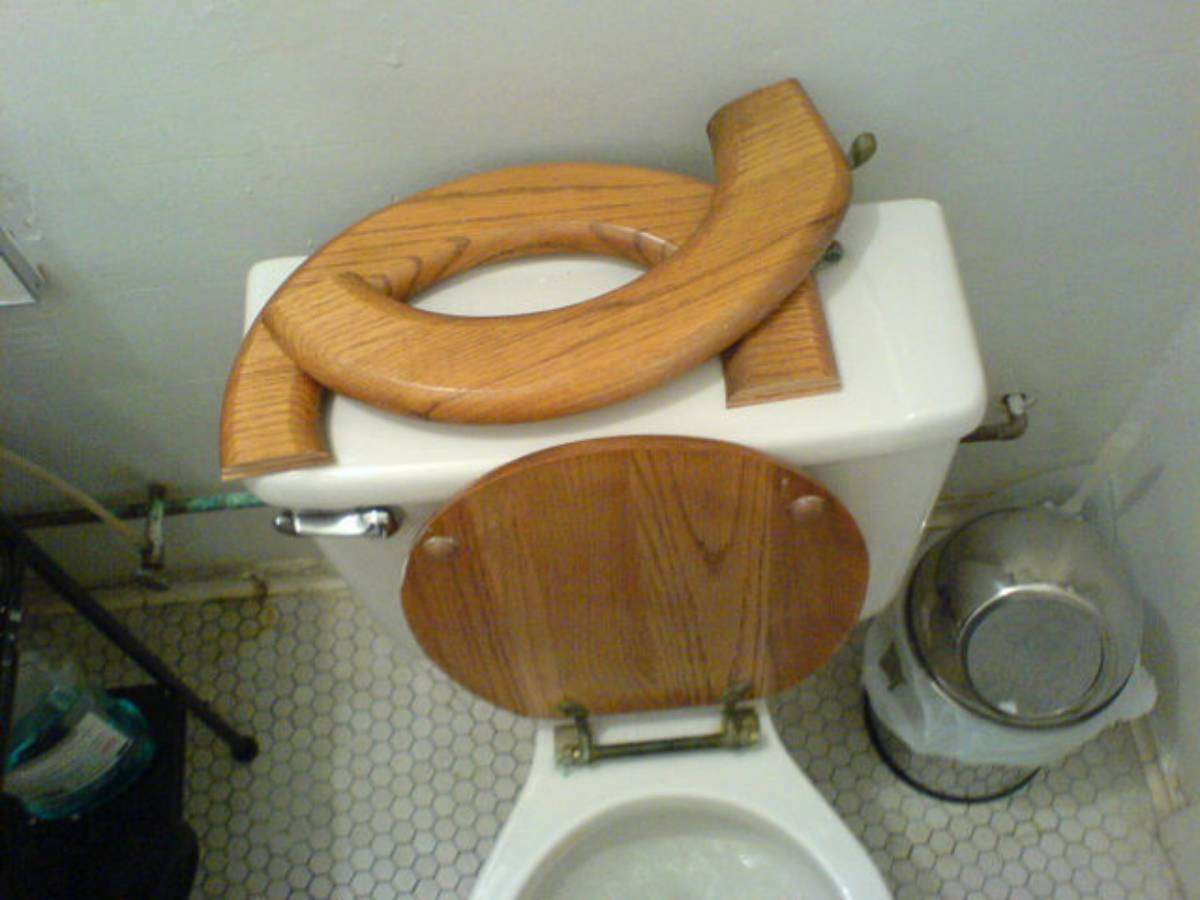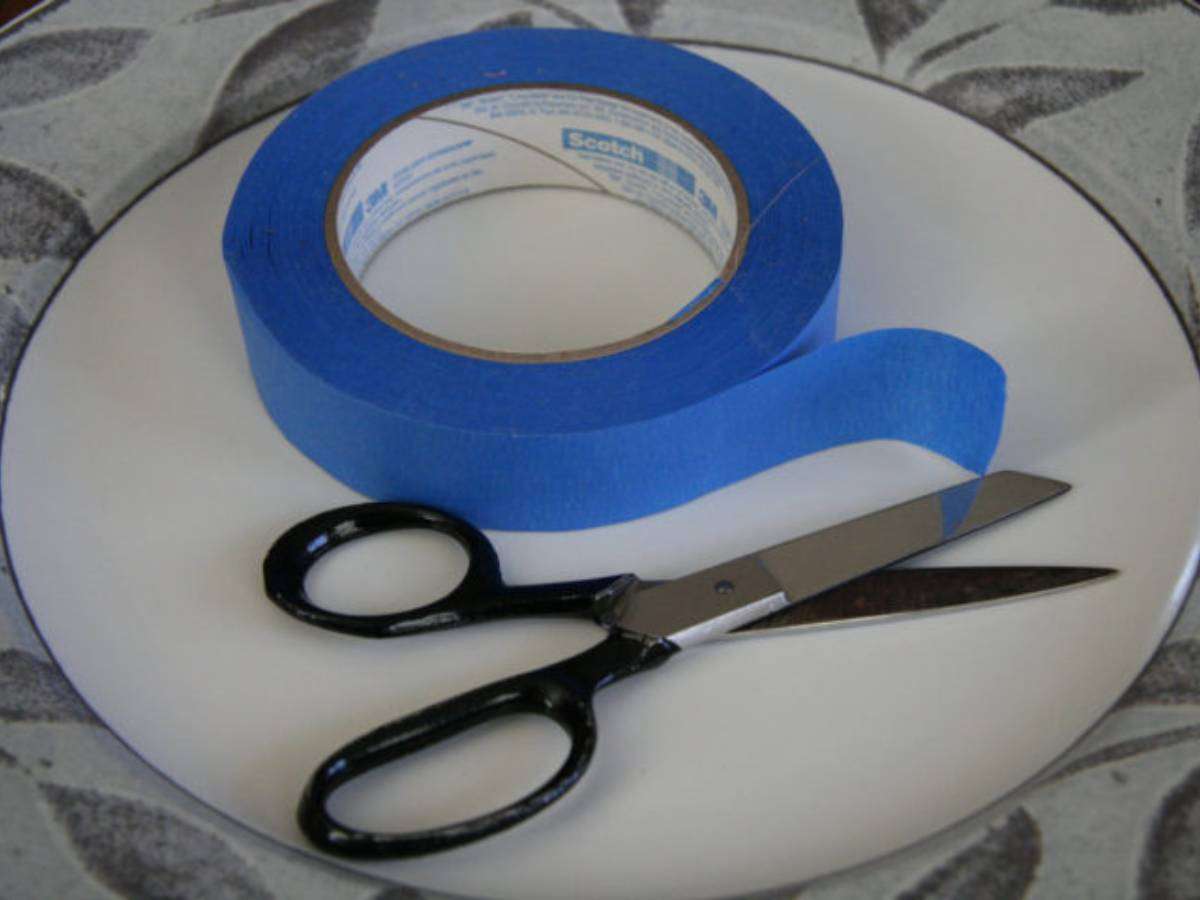When it comes to neighborhood yard sales, I’ve always wondered if it’s better to take advantage of all the free advertising they do for you — OR, if you should take the time to write your own ads, hang your own signs, and pick your own date.

I’ve participated in both private garage sales AND multi-family yard sales.
I seem to have the best success when my own personal garage sale is tied in with a neighborhood-wide yard sale event.
Here’s what I’ve learned…
Neighborhood Yard Sales vs. Going It Alone
I’ve done it both ways.
Personally, I think that community garage sales are better than simply posting an ad in the local media (or online) and hoping that people will come to your private yard sale at home.
PRO – On the plus side, with community garage sales you’re pretty much guaranteed a slew of traffic throughout most of the day!
CON – The downside is that you’ve got so much close competition — especially if your house isn’t one of the first in the subdivision or on the “main” route through the neighborhood.
And if your house is at the end of a cul-de-sac, your traffic won’t be nearly as good as homes on the corner and up closer to the main road. So, if that’s you, then you’ll definitely need to go the extra mile to call attention to your yard sale.
Here’s some good advice regarding city-wide and community-wide garage sales:
Some Neighborly Advice
If your subdivision ISN’T planning a community yard sale anytime soon, then you may want to consider getting together with a couple families yourself.
Multi-family garage sales are often more successful than single-family yard sales.
Serious yard sale shoppers tend to prioritize those that are listed as multi-family, block, or neighborhood sales. Of the three, I’d say neighborhood yard sales probably have the biggest draw.
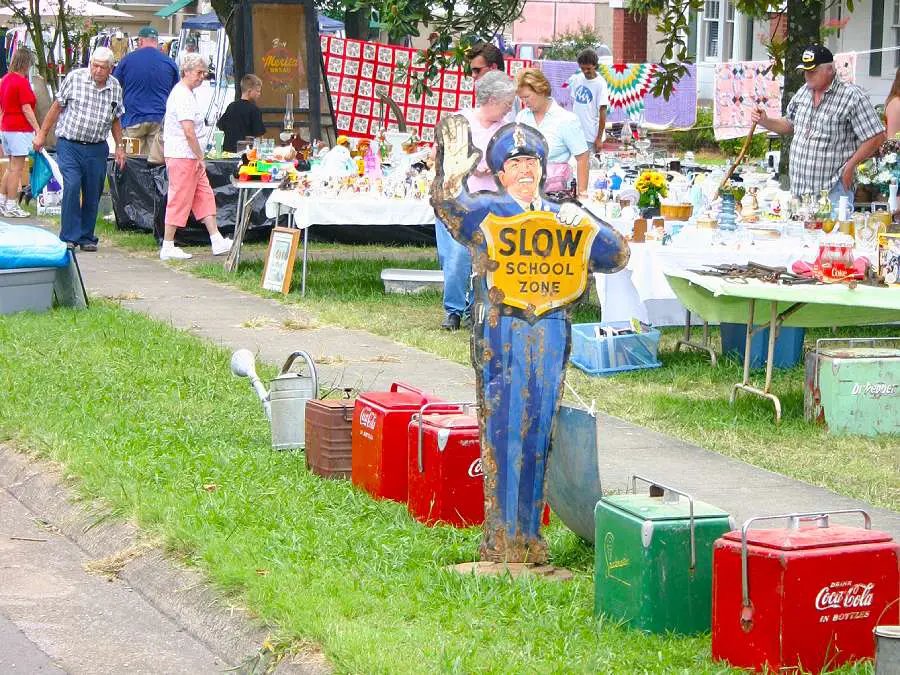
If you don’t want to do that (or if no one’s interested), then simply ask your immediate neighbors AND your friends & relatives if they have anything they wish to sell at your yard sale. The items they have on hand to sell might not be enough to warrant having their own yard sale, but it may boost yours a bit.
Sometimes neighbors are eager to get rid of a few things — the easy way — in which case you might get to keep any profits from the sale of their items.
Other times, your neighbors might only have one or two high-quality items that they’d sell if the price was right. These types of items would likely draw more people to your yard sale and help your neighbor, too! Larger, higher-quality items are attention-getters — especially sofas, appliances, and other pieces of furniture. Used lawn care items are a big draw, too.
Here’s a little secret for you… We marketed our yard sale as a three family yard sale, because it was, but the third family (my parents) didn’t contribute more than a few boxes. The most important thing about their contribution was the ability to market ourselves as a three family sale! Partner up with another family or two to help share the workload, but also to help with your marketing.
~ Cassie at Wholefully.com
10 Tips For Planning A Multi-Family Yard Sale
In addition to all of the tips contained in my Successful Yard Sale Guide For Sellers series, here are 11 tips that pertain specifically to hosting multi-family yard sales:
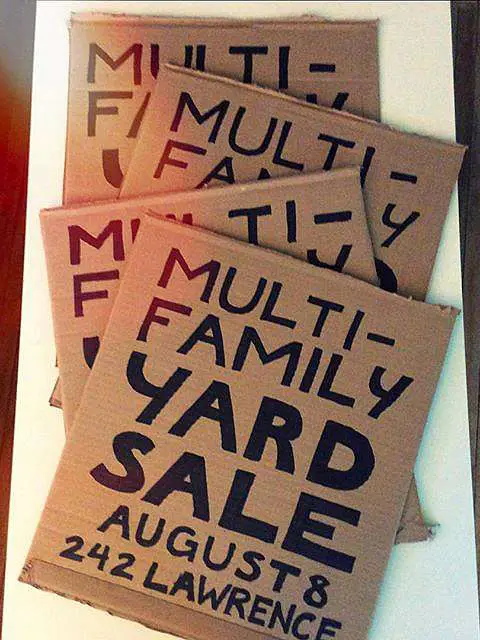
#1 – Start early planning and organizing everything for your yard sale. For my private garage sales, I usually start 2 months ahead of time. That way, I can take things at my own pace and important details are less likely to fall through the cracks. Multi-family yard sales are a bit more last-minute due to all the variables involved, but don’t wait too long!
#2 – Decide where you’re going to have the multi-family yard sale, based on two things: (1) Location — ideally, a house that’s located at a busy intersection, and (2) Who has the most indoor/garage space — for ease of organizing all items before the sale.
#3 – Have everyone drop off their items at the yard sale location at least 1 week prior to the sale date — so that everything can be organized into categories. The idea is not to sell Family #1’s things over here and Family #2’s things over there, but rather to combine everything together — by theme / category — in order to make the best impression with potential buyers.
#4 – Figure out how you’re going to keep track of each family’s sales (colored stickers or initialed stickers). I prefer to use different colored painter’s tape as price stickers. On the day of the sale, the price stickers get affixed to a blank page in a spiral-bound notebook as each item is sold — all blue stickers on one page, green stickers on another, etc. You could just as easily ask each family to put their initials on each pricetag, then use a notebook or printed logs to keep track of the initials and amount each item sold for.
#5 – Have a plan for lowering prices on-the-spot and what you’ll do if an item is sold for less than the sticker price — which happens a lot at garage sales! For example, if someone’s haggling for a lower price, who is allowed to make the call on the day of the sale to lower a price? If you’re using colored stickers, you’ll probably want to make a NEW colored price sticker on-the-spot to put in the notebook that reflects the item’s reduced price. (Just be sure to throw away the original sticker so the family isn’t paid twice for that item.)
#6 – Each family should price their own items BEFORE the day of the sale — ideally at least 1 week prior to the sale. Other things are likely to come up in that last week that will take each family’s time and attention away from the yard sale. Also, with multi-family sales you’re usually dealing with a lot of other variables on the actual day of the sale — the last thing you need is the headache associated with on-the-spot pricing!
#7 – Make a list of everyone’s assigned roles (before, during, and after the sale) and have all of the details ironed out 1 week prior to the actual garage sale. Take the time now to think through possible scenarios, so as a group you can come up with a plan for how to handle those things. Trust me, you don’t want the day of your multi-family sale to be the day those things get worked out. If so, your sales will be much lower. Determine who is going to…
- Gather all tables, boxes, crates, blankets, sheets, tarps, etc. that will be used to display items at the sale?
- Organize all individual sale items into meaningful categories/groups ahead of time (indoors)?
- Arrange all items outdoors on yard sale day — on tarps, blankets, boxes, tables, etc.?
- Make signs before the sale, post signs the day of the sale, and take down signs after the sale?
- Post yard sale ads online?
- Be responsible for the money from start to finish — from getting petty cash before the sale to being the cashier on the day of the sale and splitting up the profits after the sale? TIP: It’s best to assign one single person the role of “cashier.” You don’t want the money passing through lots of hands. Not because you don’t trust anyone — but simply because it’s easier if one person is in charge of the money bag at all times AND that person is adept at quickly making change on the spot.
- Help the cashier by keeping track of each family’s sales and put customers’ items into bags?
- Take leftover items to charity after the sale?
#8 – Start advertising 1 to 2 weeks prior to your garage sale date. If you don’t, your multi-family sale will be a flop.
#9 – Have a plan for how the final hour(s) of the sale will go. Despite what you put on the signs and in the ads, the time you decide to close down is completely up to you on the day of your sale. Your closing time should be based on: (1) How much you’ve sold (if all the good stuff is gone, there’s no need to stay open much longer for all the little stuff) and (2) How many people keep stopping by your sale (if no one’s actually browsing the items at your sale, then it appears that everything’s been picked over and there’s little reason to stop).
#10 – Agree ahead of time how all of the yard sale leftovers will be dealt with. Ideally, they’ll all be taken immediately to charity and donated. If someone says they want their items back (rather than donating them to charity), they must be present during the final hour of the yard sale to collect their things. Otherwise, one person will bear the burden of having to separate and store each family’s items until they come to pick them up — and that’s just not fair.

